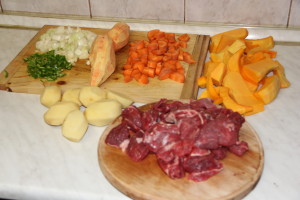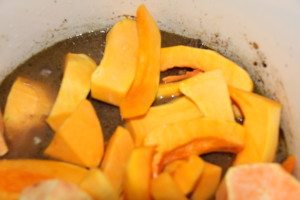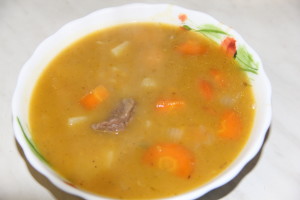


 Years ago, when I worked as a classroom assistant and tutor at an elementary school in Massachusetts, I had a colleague from Haiti and one day shortly before the holiday break we were discussing our plans for Christmas and New Years’ and she mentioned a traditional soup that Haitians both in Haiti and the diaspora eat on New Year’s Day: Soupe Joumou (in Creole) or Soupe au giraumon (in French). This is a fragrant, flavorful soup with a base of pumpkin but also containing beef, various vegetables and made mildly spicy with the addition of hot pepper and garlic. Haitians believe that starting the year off with Soupe Joumou brings good luck, health and prosperity. It is interesting how many cultures throughout the world have dishes that are said to bring good luck when consumed. If we examine Haitian history, we will see why Soupe Joumou holds such an important place in Haitian cuisine and culture.
Years ago, when I worked as a classroom assistant and tutor at an elementary school in Massachusetts, I had a colleague from Haiti and one day shortly before the holiday break we were discussing our plans for Christmas and New Years’ and she mentioned a traditional soup that Haitians both in Haiti and the diaspora eat on New Year’s Day: Soupe Joumou (in Creole) or Soupe au giraumon (in French). This is a fragrant, flavorful soup with a base of pumpkin but also containing beef, various vegetables and made mildly spicy with the addition of hot pepper and garlic. Haitians believe that starting the year off with Soupe Joumou brings good luck, health and prosperity. It is interesting how many cultures throughout the world have dishes that are said to bring good luck when consumed. If we examine Haitian history, we will see why Soupe Joumou holds such an important place in Haitian cuisine and culture.
During the colonial period, 1492-1804, Haiti was known as Saint Domingue and was populated mostly by African slaves who worked the vast sugar plantations owned by a few prominent French families. The colony was the richest in the world due to Europe’s ever growing demand for sugar and was popularly called the Pearl of the Antilles. This thriving economy was supported entirely by slave labor with enslaved Africans forced to work from dawn until late in the evening subsisting only on one ounce of salted meat or fish and one bottle of lemonade per day. Such rations come nowhere near the minimum nutritional requirements of a healthy diet so it was no wonder that slaves rarely lived longer than five years once they were set to work on the plantations. Over a ten year period starting in the 1790’s, the enslaved Africans rebelled and fought back their French captors and finally won complete independence on January 1st 1804. In order to celebrate, they made large quantities of Soupe Joumou, which had been a favorite on plantation masters’ tables but which slaves had been forbidden to touch. According to legend, steaming bowls of this delectable soup were served to the masses at Gonaives where the revolutionary hero Jean-Jacques Dessalines gave his speech proclaiming Haitians free people. For this reason, Soupe Joumou remains to this day a symbol of freedom and self-determination and continues to be a part of Haitian New Year’s celebrations.
Since first learning of this dish and the traditions associated with it, I have made Soupe Joumou several times and it never disappoints! The taste is a unique blend of sweet, salty and spicy flavors combined to make a soup that is truly Creole and amazing in all aspects. I urge you to try the recipe below for New Year’s or any time of year and while the soup simmers, pray over it in your own words and according to your own beliefs asking that you, your family and loved ones be blessed with happiness, prosperity and health in the year to come and throughout your lives.
2 cloves garlic
1⁄2 tsp. dried thyme
1 large onion diced
1 scotch bonnet pepper finely diced
Salt and freshly ground black pepper
1 lb. beef cut into cubes
2 tbsp. olive oil
8 cups beef stock
2 carrots peeled and sliced
3 large potatoes peeled and cubed
1 small giraumon (joumou) or sugar pumpkin deseeded, peeled and cut into wedges
1 cup soup noodles of your choice
In a large soup pot, brown the beef in the olive oil. Add the garlic, onion and hot pepper. Allow to cook until transparent.
Add the beef stock and bring to a simmer. Add the wedges of giraumon or pumpkin and cover. Simmer until the pumpkin is easily pierced by a fork.
Remove the cooked pumpkin and blend into a smooth puree, adding a bit of broth from the soup if necessary.
Return the puree to the soup pot and allow to come to a simmer.
Add the carrots and simmer until tender.
Add the potatoes and simmer until tender.
Lastly add the soup noodles and cook until done. Season with salt and pepper to taste.
I hope you give this recipe a try. Soupe Joumou is meant to be shared in a spirit of community and good will and is the perfect way to kick off the New Year. I thank you for taking the time to read this blog post and as always I wish you abundant blessings!